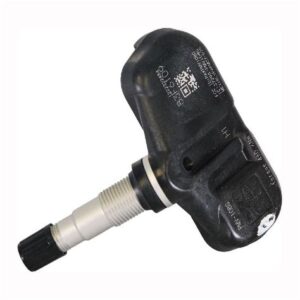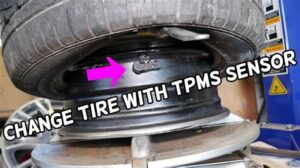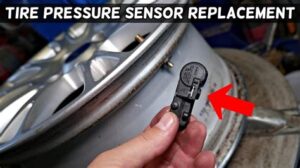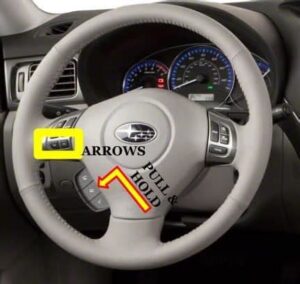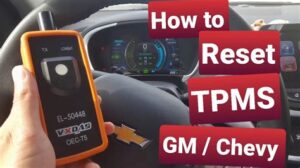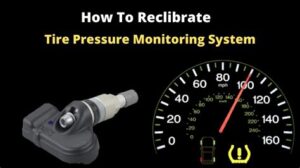Learn about tire pressure sensors, their importance, signs of low pressure, benefits, and how to choose the right sensor for your Chevy Colorado.When it comes to ensuring the safety and performance of your Chevy Colorado, understanding your tire pressure sensor is crucial. This small yet powerful device plays a significant role in monitoring tire pressure, alerting you to potential issues before they escalate. Maintaining the correct tire pressure is not just about extending the life of your tires; it also enhances fuel efficiency and overall driving safety. In this blog post, we’ll delve into the importance of tire pressure management, identifying the signs of low tire pressure, and exploring the benefits of using tire pressure sensors. Additionally, we’ll guide you on how to choose the right sensor tailored for your Chevy Colorado, ensuring that your vehicle runs smoothly and safely on the road. Join us as we unravel the vital connection between tire pressure, vehicle performance, and your driving experience.
Understanding Tire Pressure Sensor
A tire pressure sensor is a crucial component of modern vehicles, including the *Chevy Colorado*. It is designed to monitor the air pressure inside your tires and provide real-time data to the driver. By doing so, these sensors play a vital role in ensuring road safety and enhancing vehicle performance.
Tire pressure sensors can be of two main types: direct TPMS (Tire Pressure Monitoring System) and indirect TPMS. Here’s how they differ:
| Type | Description | Pros | Cons |
|---|---|---|---|
| Direct TPMS | Measures tire pressure directly using a sensor mounted inside each tire. |
|
|
| Indirect TPMS | Uses wheel speed sensors to estimate tire pressure based on the rotational speed of the tires. |
|
|
Understanding how your tire pressure sensor works is vital for the safety and efficiency of your vehicle. Monitoring tire pressure regularly not only ensures a smoother ride but also enhances fuel efficiency, prolongs tire life, and improves overall handling. Neglecting tire pressure can lead to unsafe driving conditions and increased wear on your tires.
In the context of the *Chevy Colorado*, being aware of the specific type of tire pressure sensor installed and how to interpret its signals can make a significant difference in your vehicle maintenance routine. Make sure to consult your owner’s manual for detailed information about your specific model’s tire pressure system.
Importance of Maintaining Correct Pressure
Maintaining the correct tire pressure is crucial for the overall performance and safety of your vehicle, especially for the Chevy Colorado. Here are several key reasons why proper tire pressure is essential:
- Enhanced Safety: Incorrect tire pressure can lead to reduced traction and increased stopping distance. When your tires are properly inflated, they provide better grip on the road, which is vital for safe driving.
- Improved Fuel Efficiency: Under-inflated tires create more rolling resistance, meaning your engine has to work harder to move the vehicle. Maintaining the correct tire pressure can improve your vehicle’s fuel economy, saving you money at the pump.
- Extended Tire Life: Tires that are consistently inflated to their optimal pressure experience less wear and tear. This means you can enjoy a longer lifespan from your tires, delaying costly replacements.
- Better Handling: Properly inflated tires ensure that your Chevy Colorado handles better, providing you with a smoother and more responsive driving experience. This is particularly important when navigating corners or driving on uneven surfaces.
- Reduced Risk of Blowouts: Low tire pressure increases the risk of tire blowouts. Driving on under-inflated tires generates excess heat, which can compromise the integrity of the tire. Keeping the pressure at recommended levels significantly reduces this risk.
Regularly checking and adjusting your tire pressure should be part of your routine vehicle maintenance to ensure both your safety and the performance of your Chevy Colorado.
Signs of Low Tire Pressure
Maintaining proper tire pressure is crucial for the safety and performance of your vehicle, including the Chevy Colorado. Recognizing the signs of low tire pressure can help prevent serious issues on the road.
- Warning Light: One of the first indicators is the tire pressure warning light on your dashboard. If this light illuminates, it’s time to check your tire pressure.
- Poor Handling: If your Chevy Colorado feels unresponsive or pulls to one side while driving, low tire pressure could be the culprit.
- Increased Tire Wear: Inspect your tires for uneven wear patterns. Tires with low pressure tend to wear down more quickly on the edges.
- Bulging Tires: Inspect your tires visually. If you notice any bulges or blisters on the sidewalls, it may indicate low pressure and potential tire failure.
- Reduced Fuel Efficiency: Low tire pressure can cause your engine to work harder, leading to decreased fuel efficiency. If you’re filling up more often, check your tire pressure.
- Poor Braking Performance: Low tire pressure can affect your braking distance. If you notice longer stopping distances, check your tire pressure immediately.
Understanding these signs can help you maintain optimal tire pressure, ensuring safety and efficiency in your Chevy Colorado. Regular checks and timely interventions can save you from potential roadside troubles.
Benefits of Using Tire Pressure Sensors
The tire pressure sensor in your vehicle serves a crucial role in ensuring both safety and performance. Here are some of the key benefits of using tire pressure sensors:
- Enhanced Safety: Proper tire pressure is essential for vehicle stability and control. Tire pressure sensors alert you to low tire pressure, helping to prevent blowouts and accidents.
- Improved Fuel Efficiency: Under-inflated tires increase rolling resistance, leading to higher fuel consumption. By maintaining optimal pressure with the help of sensors, you can achieve better fuel efficiency.
- Extended Tire Life: Keeping tires at the recommended pressure can significantly extend their lifespan. Regular monitoring through tire pressure sensors can prevent uneven wear and tear.
- Convenience: Tire pressure sensors provide real-time information about your tire’s condition, eliminating the need for manual pressure checks and allowing for timely adjustments.
- Reduced Environmental Impact: Efficient fuel consumption leads to fewer emissions. By using tire pressure sensors, you contribute to decreasing your vehicle’s carbon footprint.
In addition to these benefits, integrating tire pressure sensors into your Chevy Colorado can enhance your overall driving experience. Properly monitored tire pressure helps in optimizing the performance of your vehicle, ensuring a smoother and safer ride.
Tires are the only contact your vehicle has with the road. Ensuring they are properly inflated is not just a choice—it’s a necessity. – Automotive Expert
How to Choose the Right Sensor for Chevy Colorado
Choosing the right tire pressure sensor for your Chevy Colorado involves several considerations to ensure that your vehicle operates efficiently and safely. Below are some key factors to keep in mind when making your selection.
1. Compatibility
Before purchasing a tire pressure sensor, ensure that it is compatible with your specific model of Chevy Colorado. Vehicle models may vary in their sensor specifications, and using an incompatible sensor may lead to malfunctions. Check your vehicle’s manual or consult with a knowledgeable technician.
2. Sensor Type
There are generally two types of tire pressure sensors: direct and indirect.
- Direct Sensors: These sensors are mounted on the tire’s valve stem and provide accurate tire pressure readings. They are preferred for their reliability and real-time data.
- Indirect Sensors: These use the vehicle’s ABS system to estimate tire pressure based on wheel speed and may not provide direct pressure readings. They can be a cost-effective option but may not be as precise.
3. Brand Quality
Opt for reputable brands known for quality and reliability. Investing in a sensor from a trustworthy manufacturer can ensure durability and accurate performance.
4. Installation Ease
Consider whether you want to install the tire pressure sensor yourself or have it professionally installed. Some sensors are designed for easy DIY installation, while others may require specialized tools and expertise.
5. Price vs. Features
While it might be tempting to go for the cheapest option, balance the price with the features that are important for your Chevy Colorado. Look for sensors that offer additional features such as temperature monitoring or integration with mobile apps.
6. Warranty
Choose sensors that come with a warranty. This indicates the manufacturer’s confidence in their product and provides you with peace of mind in case of defects.
7. Customer Reviews
Before making a final decision, check customer reviews and ratings. This can help you gauge the sensor’s performance and reliability from real-world users. Pay attention to feedback specifically related to Chevy Colorado models.
By following these guidelines, you can select the right tire pressure sensor for your Chevy Colorado, ensuring your vehicle operates safely and efficiently.
Frequently Asked Questions
What is a tire pressure sensor in a Chevy Colorado?
A tire pressure sensor in a Chevy Colorado is a device that monitors the air pressure in the vehicle’s tires, ensuring they are inflated to the optimal levels for safe driving.
Why is it important to monitor tire pressure?
Monitoring tire pressure is crucial for safety, fuel efficiency, and tire longevity. Under-inflated tires can lead to poor handling and increased fuel consumption, while over-inflated tires can cause premature wear.
How often should I check my tire pressure?
It is recommended to check your tire pressure at least once a month and before long trips to ensure optimal performance and safety.
What could cause a tire pressure sensor to malfunction?
Common causes of tire pressure sensor malfunctions include a dead battery in the sensor, damaged wiring, valve leaks, or incorrect tire pressure readings due to environmental factors.
How do I reset the tire pressure sensor on a Chevy Colorado?
To reset the tire pressure sensor, inflate the tires to the recommended pressure, turn the ignition on without starting the engine, and press the reset button located near the steering wheel or in the glove box.
Can I drive my Chevy Colorado if the tire pressure light is on?
It’s advisable to investigate the cause of the tire pressure light being on before driving. Driving with a low tire pressure can be dangerous and may lead to tire damage.
What should I do if my tire pressure sensor is broken?
If your tire pressure sensor is broken, it’s best to have it inspected and replaced by a professional. Driving with a malfunctioning sensor can lead to undetected tire issues.
